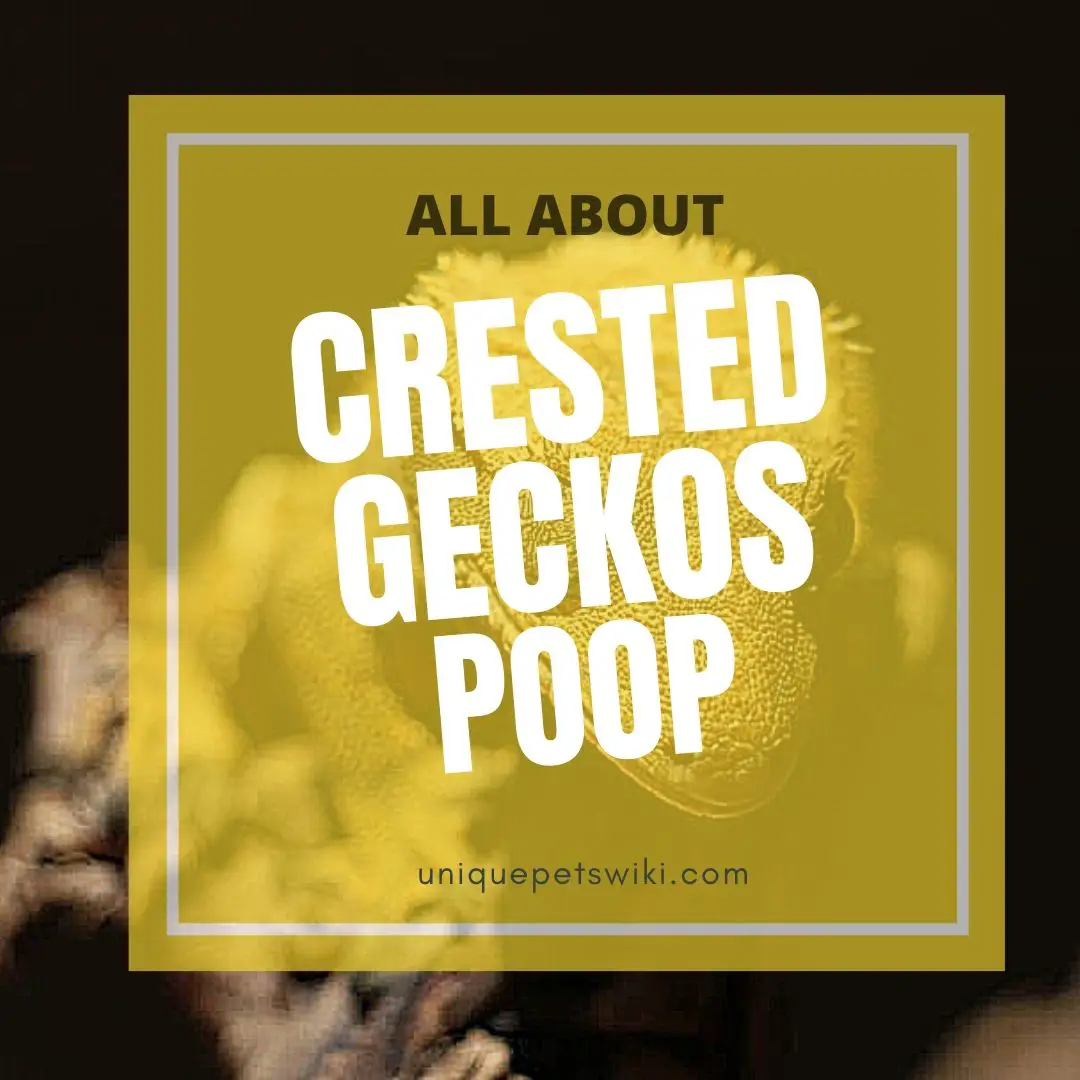Pooping is among the essential functions of living organisms. Like most animals, crested gecko poop is a great indicator of crested gecko’s health.
In this article, you will get an insight into everything about crested gecko poop. You will learn more about the features of a normal crested gecko poop, what red, white, and runny poop means, and lots more.
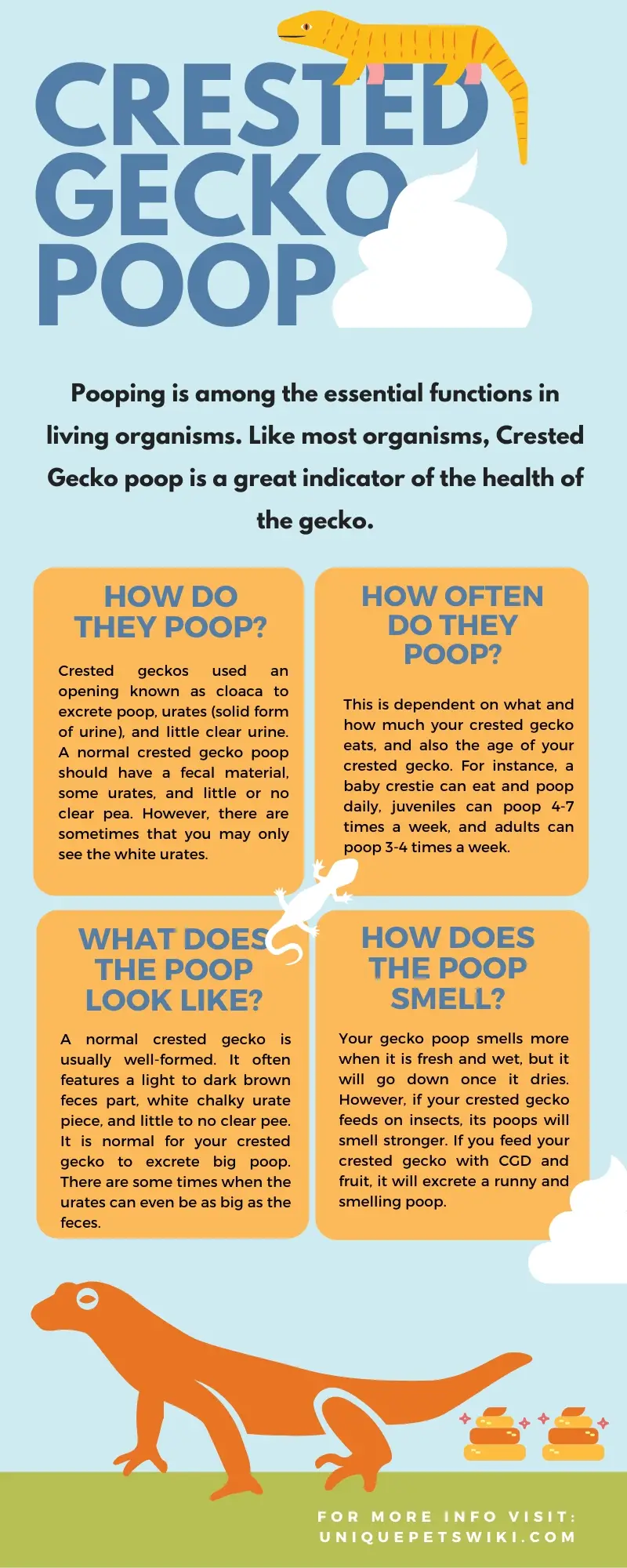
This article has been reviewed by Dr. Gospel. Read more about our knowledge control process here.
Contents
How Do Crested Geckos Poop?
Crested geckos used an opening known as cloaca to excrete poop, urates (solid form of urine), and little clear urine.
A normal crested gecko poop should have fecal material, some urates, and little or no clear urine. However, sometimes you may only see the white urates.
Let’s continue reading
How Often Do Crested Geckos Poop?
This is dependent on what and how much your crested gecko eats, and also the age of your crested gecko.
For instance, a baby crestie can eat and poop daily, juveniles can poop 4-7 times a week, and adults can poop 3-4 times a week.
What Does Crested Gecko Poop Look Like?
A normal crested gecko is usually well-formed. It often features a light to dark brown feces part, white chalky urate piece, and little to no clear urine.
You should be on the lookout for red or runny poop as it indicates issues.
Crested gecko excretes urate, a solid form of urine instead of liquid urine, for minimizing water loss. The urate and poop excreted by cresties can be big or small based on different factors, such as its size or diet.
If you feed your gecko with feeder insects, the poop will be bigger and smell stronger. It might have some pieces of poorly digested bugs as well. It is normal for your crested gecko to excrete big poop.
There are some times when the urates can even be as big as the feces.
Crested Gecko Poop Smell
Your gecko poop smells more when it is fresh and wet, but it will go down once it dries.
Crested Gecko Diet and Smell
If you feed your crested gecko with CGD and fruit, it will excrete a runny and smelling poop.
Crested geckos fed with cricket and insect diet poop is usually firmer but also smelly.
Crested gecko poop can smell nasty if you change their diet. For instance, changing from a total junk food diet to a healthy diet.
How to Improve the Crested Gecko Poop Smell?
Your crested gecko tank will smell worse after they poop if you are not using an absorbent substrate.
It is best to use coconut substrate and sphagnum moss to reduce the smell of your gecko’s tank.
New to crested gecko? Check out the crested gecko care sheet now! We had listed out all the things you need to know about crested geckos as pets. Check it now!
If you notice that your gecko’s tank is smelling, you can just switch out the substrate.
Crested Gecko Not Pooping
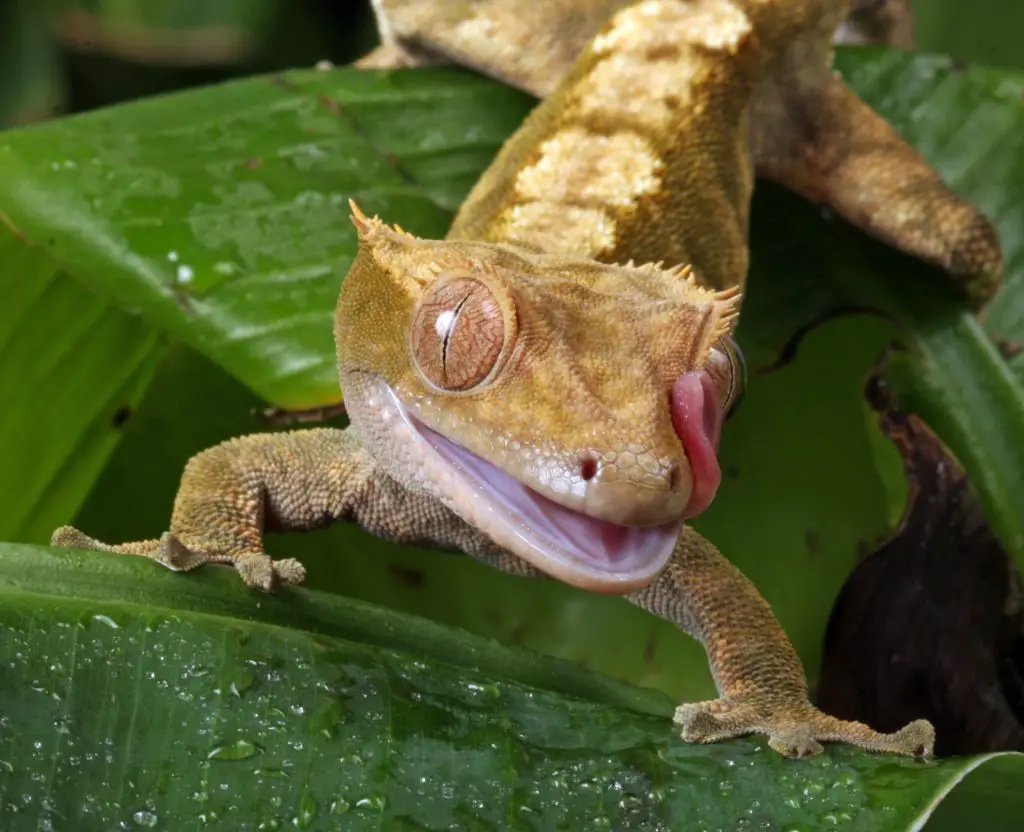
Why is My Crested Gecko Not Pooping?
Your crested gecko may not be excreting poop for several reasons. Some of the reasons why your gecko is not pooping are stated below.
You Do not See The Poop
Crested geckos do not excrete very often, and it may be hard for you to notice their poop in a loose substrate. Smaller geckos excrete small poops, and it will be hard to find it. Sometimes if your crested gecko’s tank is large, it may be hard to find their poop.
Crested geckos can poop in different places, and you will need to check their hides, foliage, food and water cups, walls, and so on.
It is best if you put baby crested geckos on paper towels until they grow to around 20 grams if you want to see their poops.
You should also ensure you perform a more in-depth cleaning of their tank at least once a week to clean crested geckos poop.
Your Crested Gecko Eats Little Food
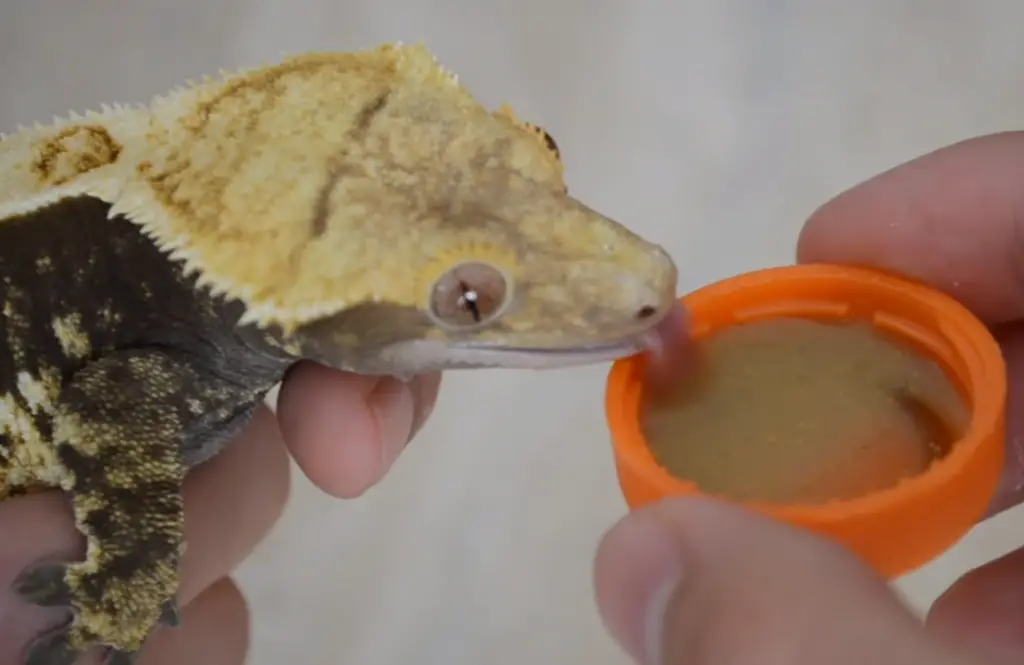
If you notice that your gecko is not pooping for around 4-6 days, it may not be eating much. It can be hard to determine if your crested gecko is eating, but you can check its food cup for lick marks.
If you find urates without brown feces next to them, it may suggest that your gecko is not eating.
Crested geckos do not eat much as they can get satisfied by taking a few licks of food or 2-3 small crickets. However, your crested gecko may not eat very much during their breeding season, shedding period, or when settling into a new home.
Eating deficiency can also be caused by mineral and vitamin deficiency, parasitic infection, low temperatures, and bullying in the tank.
Your Gecko is Constipated
Constipation of your crested gecko can occur if you feed them with large feeder bugs, or if there are loose substrate in the tank.
Your crested gecko cannot properly digest very large feeder insects, and it may get stuck in their intestines.
Your crested gecko can have difficulty digesting if you feed them with bugs with hard skin or sharp legs.
This is why it is best to avoid keeping your hatchling and juvenile crested geckos on a loose substrate. They can be curious and ingest the substrate, which can cause impaction.
If your gecko has constipation, ensure there is a cup with water with them at all times. You should also mist your gecko once a day. You can also offer them high fiber fruit or massage its belly.
Low Temperatures in Their Tank
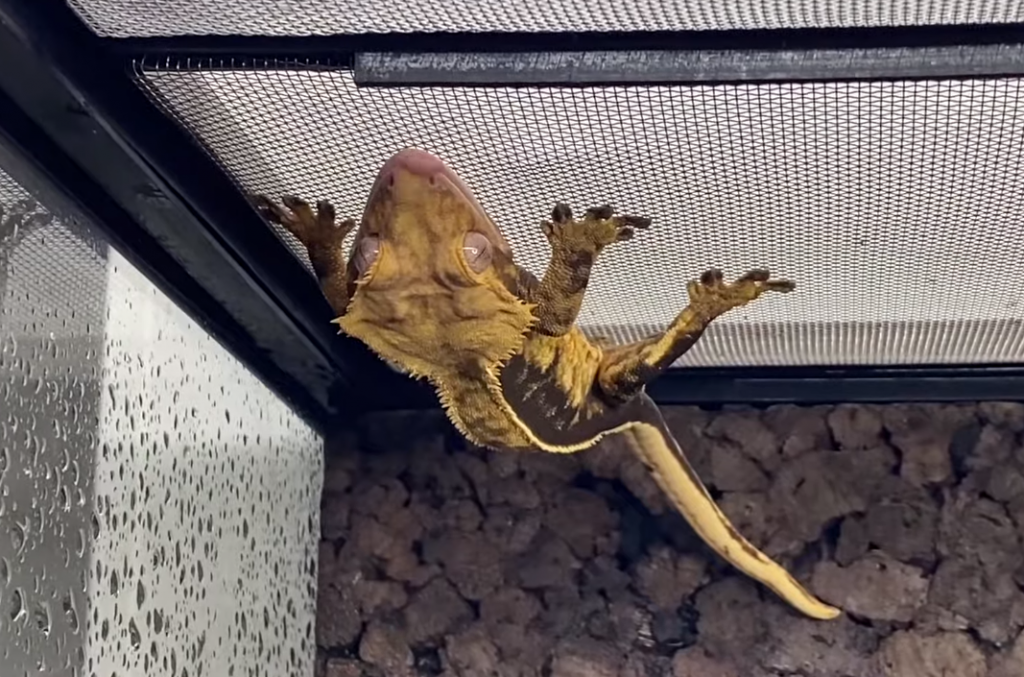
Low temperatures in a crested gecko’s tank can lead to poor appetite and digestion. This is because crested geckos are cold-blooded animals and need environmental temperatures to stay warm.
The optimal daily temperature suitable for your gecko is between 71-79 degrees Fahrenheit. There should also be a warm side and a cool side to create a temperature gradient.
You can install a digital thermometer to ensure that your crested gecko’s tank is of optimal temperature.
Your Crested Gecko is Dehydrated
Your crested geckos may not poop when dehydrated. It is best to have a cup with fresh water in your pet’s tank where they can drink from. You will also need to mist their tank once or twice a day to prevent dehydration.
New to crested gecko? Check out the crested gecko care sheet now! We had listed out all the things you need to know about crested geckos as pets. Check it now!
You can determine if your crested gecko is dehydrated if its skin looks loose. Dehydration of crested gecko can cause poor appetite and digestion, which can lead to constipation.
Your Crested Gecko is Sick
Pooping and the general well-being of your gecko can be affected by parasitic infections. Your crested gecko might be infected if losing weight, pooping loose whitish substance, or lethargy. However, runny whitish urates are normal, but weight loss is a primary indicator that your gecko is sick.
How long Can a Crested Gecko Go Without Pooping?
It can go without pooping for about a week. However, since it is easy to miss crested geckos poop, try to check if it is not hidden anywhere in the cage. If your gecko did not poop for ten days or more, it is a sign of constipation.
New crested geckos in a new environment may be stressed and not eat. It is best if you keep small crested geckos under 20 grams in a 3-6 gallon Kritter Keeper. You can then transfer it to a 20-30 gallon terrarium once it hits 20 grams.
You can also keep baby crested geckos on paper towels until they are around 20-25 grams.
Why is My Crested Gecko’s Poop Runny?
Crested gecko poop can be runny for many reasons like shedding, parasites, diet changes, or stress. However, runny poop in crested geckos can be resolved quickly.
A new crested gecko can have runny poop for a few days after introducing it to a new home. Introducing crested gecko to a new environment can be stressful for your gecko and cause runny poop.
However, it will pass once your crested gecko is settled.
If your crested gecko has runny poop after they finish shedding, it will pass after some days. Your crested gecko can have diarrhea if it is infected with parasites.
If your crested gecko has runny poop for more than a week without dietary change, you can go for a fecal test.
Crested Gecko Diet and Runny Poop
Changes in diet can cause runny poop. Your gecko can have diarrhea, even if you make a small change like giving a snack or feeding with a new CGD. It is best if you stick to the crested gecko diet such as bugs for your gecko. You can then give them small portions of snacks once a while.
Crested Gecko Pooping Blood?
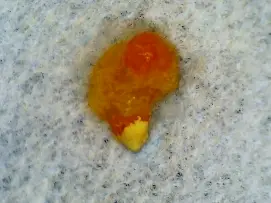
There is an issue if your crested gecko’s poop is red or bloody. Blood in poop can indicate intestinal impaction, damage in the intestine and cloaca, internal bleeding, parasitic infection, and so on.
You will need to take your gecko to the vet immediately if you notice any blood in it. Your gecko will need to be screened for parasites and bacterial cultures that can indicate an infection.
However, try not to confuse blood and pigmentation with each other. Sometimes, your crested gecko’s poop can be pigmented after eating red-colored fruits or berries. Some crested geckos diets can also color your crested gecko poop.
Your crested gecko can have poop pigmentation if you feed them with gut-loaded feeder insects. This is because some sellers feed their feeder insects with fish flakes or similar food that can cause pigmented poop.
Why is My Crested Gecko’s Poop White?
Normal crested gecko poop has a brown part, urate, and some clear urine. There are times when your gecko will excrete only urates. If your gecko excretes little to no feces, it means that it has not eaten much. Some geckos may excrete only urates after eating.
You should just note the last time your crested gecko eats. If your crested gecko pooped the last time it ate and it is normal, then your gecko is fine. There are times when the urate is bigger than the poop, and you will think that poop is absent.
However, you can keep an eye on your crested gecko by placing it on paper towels if you suspect anything.
Crested Gecko Poops on Me
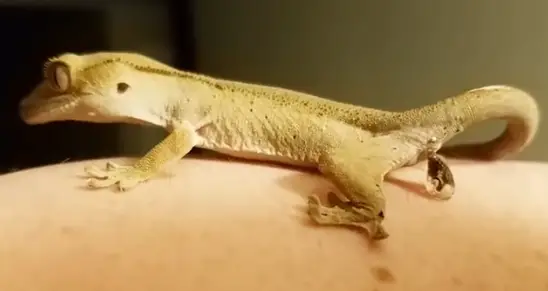
There are times when crested geckos will poop on its owner during handling. Crested geckos can poop during handling based on several reasons. Some of the reasons are:
- It is slightly stressed
- It is relaxed in your warm hands which is less common
- It poops on you so that you will put it back in the cage
However, if your crested gecko poops on you, do not put it back in the cage for some minutes. You can use this method to train it to not poop on you to put it back in the cage.
